Should you have your cat neutered?
What are the advantages and disadvantages of neutering a cat?
Neutering is a delicate subject. An operation in which the reproductive organs are severed or removed. There are wild rumours circulating about what castration does to a cat. Neutered cats are said to completely change their behaviour or gain weight. True or are these just old wives’ tales from people who are fundamentally against animal surgery? What are the reasons for neutering cats in the first place? Is it necessary? Shouldn’t we just let nature take its course instead of subjecting the cat to such an operation?
We have collected answers to the most frequently asked questions about neutering cats! And here they are.
Should I neuter my cat?
Do you want to breed cats? Then of course you shouldn’t neuter your cat. Unneutered cats are obviously quite fertile! In no time there are six more hungry mouths at the door! There are already a huge number of cats of all ages that are “pawsitively” looking for a home: rescued strays, unwanted litters, cats from divorces or family break-ups. They are all to be found in local animal shelters. So you should think carefully about whether you want kittens, as there are already many cats without a home.
Advantages of neutering cats
Neutering has the advantage of avoiding the transmission and development of diseases. Unneutered outdoor cats have many contacts and can pass on diseases in the process. Since ovulation in cats is only triggered by penetration, unneutered female indoor cats often have to contend with permanently being on heat. When a male cat becomes sexually mature, he wants to act on his urges. But as an indoor lounge lion he cannot. Tomcats will start to spray more. And it’s very difficult to get rid of this strong lingering smell! Powerful arguments in favour of neutering, aren’t they? So neutering offers a few convincing advantages:
- less transmission of disease
- no permanent heat for females
- fewer strong urine smells from tomcats spraying
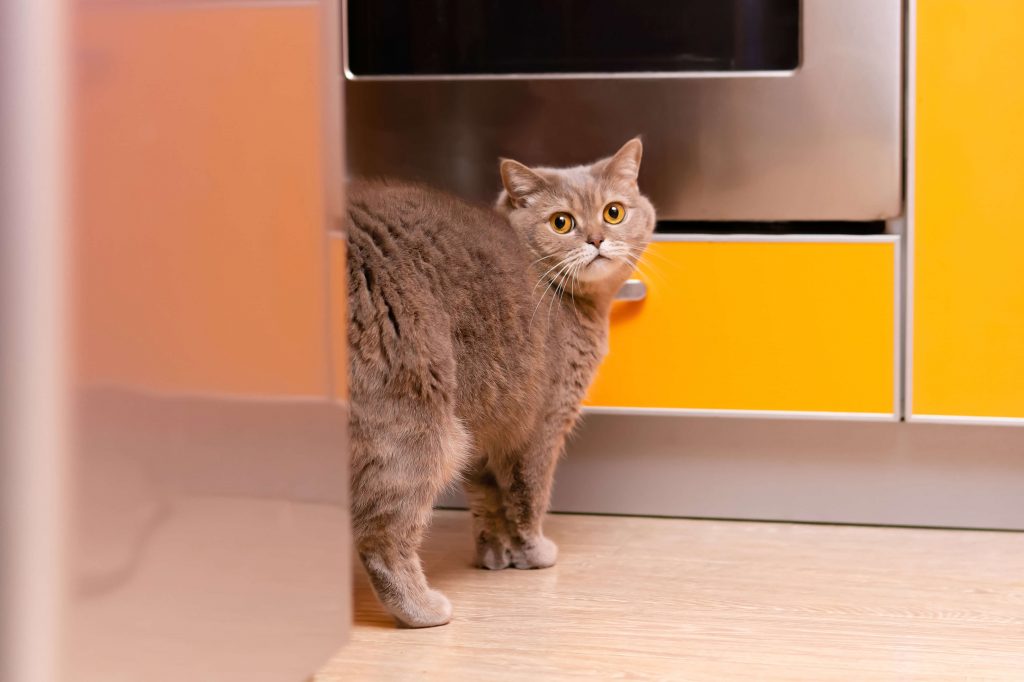
Disadvantages of neutering cats
Of course, every surgical procedure carries certain risks: complications may arise during the operation or the cat may not tolerate the anaesthetic very well. However, neutering is a routine procedure that veterinarians perform thousands of times a year. They are experienced at it. Due to hormonal changes, neutered cats have a bigger appetite than before. However, if you change to a calorie-reduced food and provide sufficient exercise, your cat will maintain its body weight. The disadvantages of neutering cats are:
- possible complications during the operation
- after-effects of the anaesthetic
- weight gain due to changed hormone levels
Spay or neuter cat?
Sterilisation prevents your cat from producing offspring or becoming pregnant. Don’t worry, it’s only your cat getting sterilised, not you! In a male cat, the vas deferens are cut or removed; in a female cat, the fallopian tubes are blocked or removed. The path between the eggs and sperm is thus blocked. During castration, the reproductive glands that produce the sex hormones are completely removed: the testicles in the male, the ovaries and sometimes also the uterus in the female. Without the production of sex hormones neutered male and female cats are no longer sexually active.
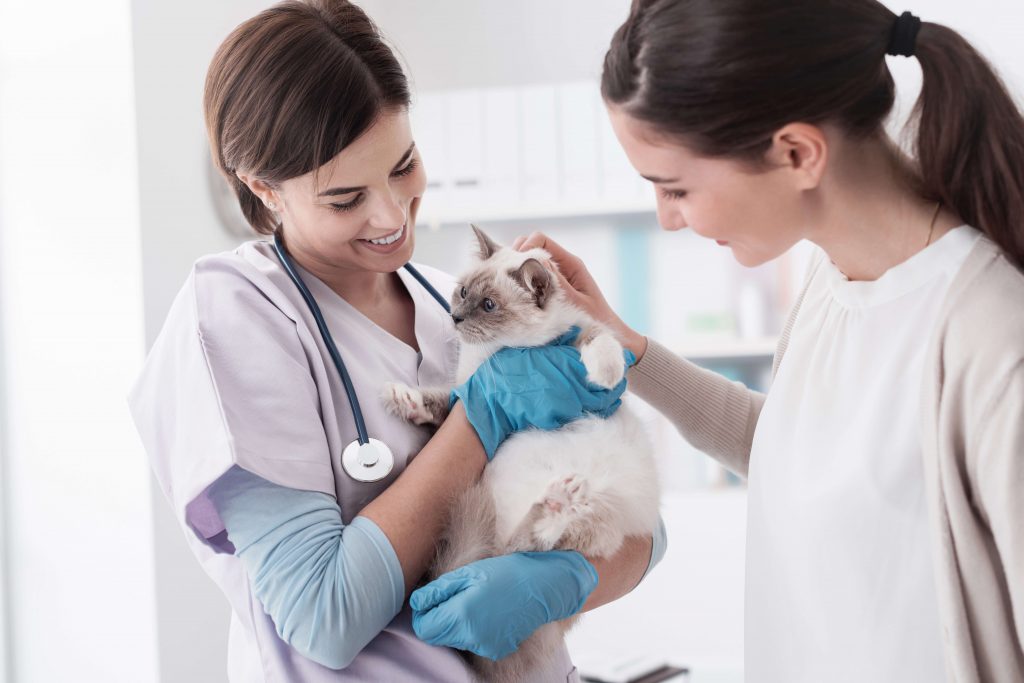
Questions about neutering a cat
So small and cute! But kittens quickly become adult cats and then the question of neutering a cat inevitably arises. Yes or no? Particularly if the kitten is allowed outside, has a lot of contact with other cats, or shares her home with cats of the opposite sex. When hormones are running high, sparks can easily fly. But cats can’t simply avoid each other in the living room. This can quickly turn into torment for weaker and submissive cats! Neutering makes life less stressful.
Is there an obligation to neuter cats?
There are currently an estimated 3 million stray cats in Germany. And the numbers continue to rise! In order to curb an uncontrolled increase in cats, a regulation for the protection of outdoor cats has existed in certain municipalities since 2013. The introduction of the Animal Welfare Act paragraph 13bprovides for mandatory castration for cats.
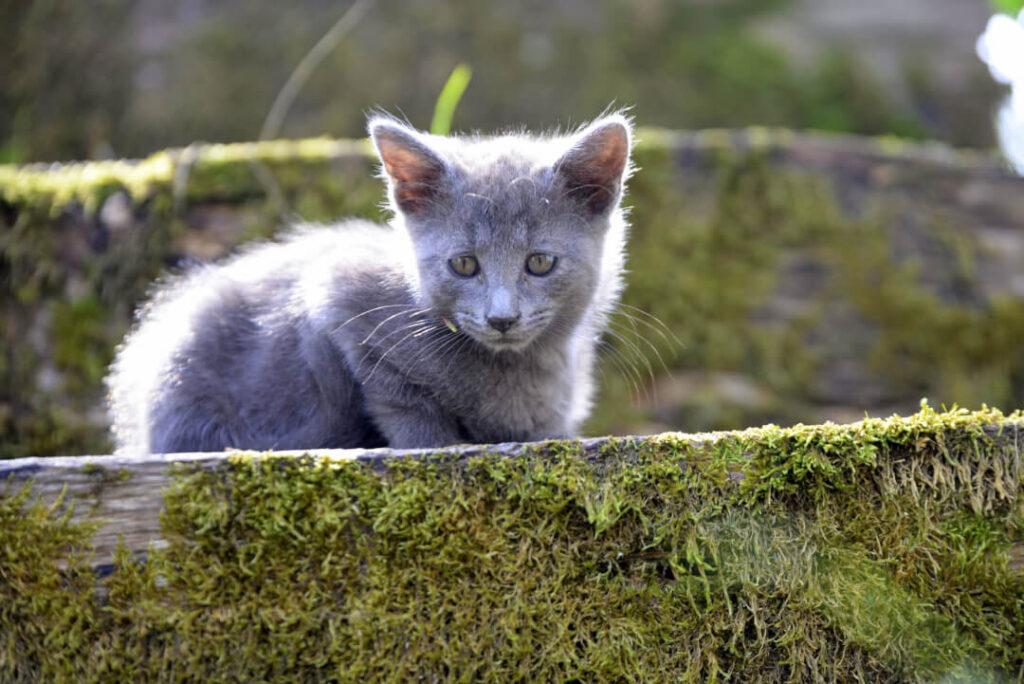

This cat protection regulation exists in 10 federal states (Germany):
- Baden-Württemberg
- Bavaria
- Hesse
- Mecklenburg-Western Pomerania
- Lower Saxony
- North Rhine-Westphalia
- Rhineland-Palatinate
- Saxony-Anhalt
- Schleswig-Holstein
- Thuringia
When should you neuter your cat or tomcat?

When is the best time to neuter a male or female cat? Is it better to neuter them before they are sexually mature or after? Cat specialists have different opinions about this. Depending on the breed, constitution and body weight, female cats become sexually mature at four to twelve months. The lords of the manor – the male cats – mature at eight to ten months. Ask your vet for advice on proper timing. S/he has known your cat from when it was kitten and will advise you accordingly!
How much does neutering cost?
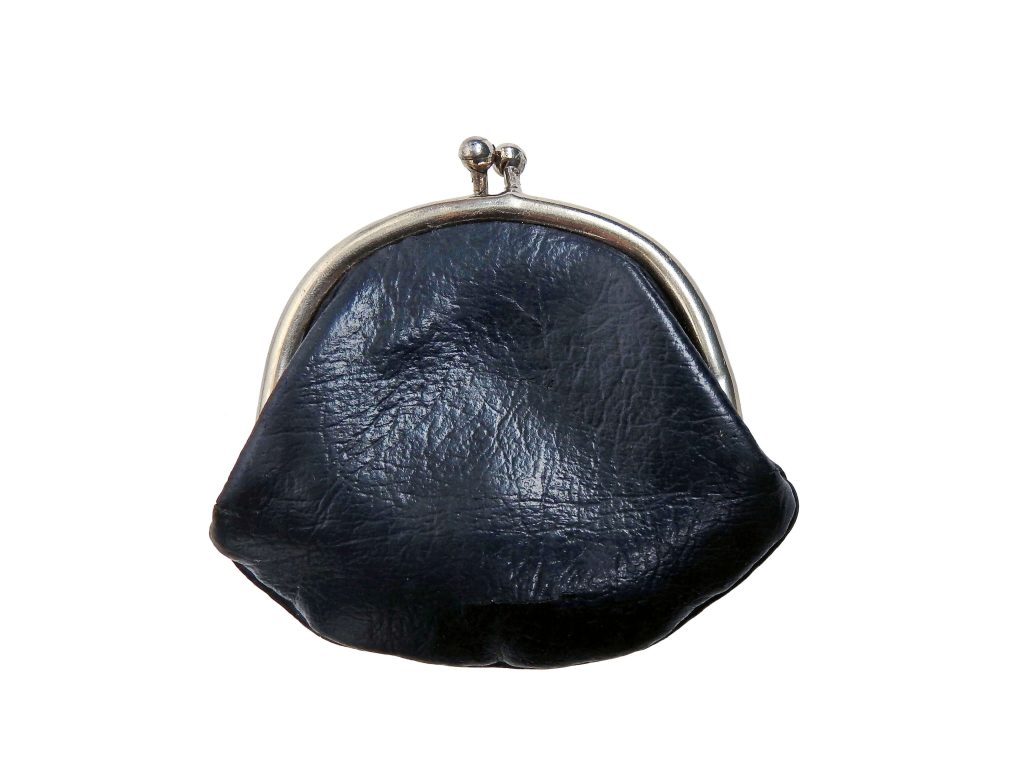
If you want to know what castration costs, you can ask the vet of your choice beforehand without any obligation. Essentially, the costs for veterinary procedures are based on a schedule of fees. However, the amount an individual vet charges may vary slightly. For a male cat, the average cost is 100 euros. Since the operation for a female cat is somewhat more complex, you will have to pay about 130 euros.
Neutering a cat – the procedure
You can’t simply march off to the vet, head to the treatment table and get your cat neutered. It’s not usually that simple! It’s a procedure that needs some preparation. How does it work? Before the procedure starts, your cat will be thoroughly examined
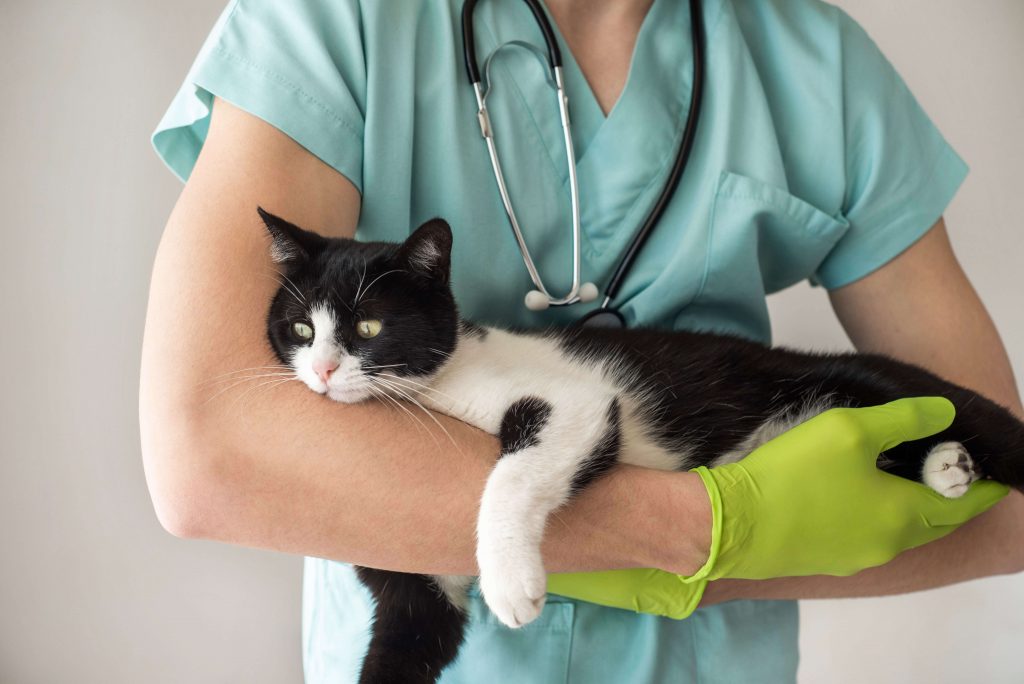
EOnly then will they be given an anaesthetic to put them to sleep so they don’t feel any pain. The area where the operation will take place will be cleared of fur, cleaned, thoroughly disinfected and then covered with a sterile cloth, leaving only the area where the operation will take place free. While your cat is neutered, her pulse and breathing are monitored the whole time.
Before castration: precautions for surgery

The day before neutering, you shouldn’t give your cat any food late in the evening. Eight hours before surgery, the cat should have eaten its last meal. Why is this important? Can it be life-threatening if you don’t do this? With a full stomach your cat could vomit food. This is dangerous because vomited food can interfere with breathing during the anaesthetic.
Spaying procedure for a female

The procedure takes a little longer on a female cat than on a male. It is more time-consuming to remove the ovaries. Depending on the condition of the uterus – for example if there are any abnormalities – it is removed immediately (hysterectomy). However, due to the lack of hormones in the ovaries, the uterus will shrink on its own over time anyway. When the ovaries (ovariectomy) and uterus have been removed, the abdominal incision is sutured.
Neutering procedure for a male cat

It’s a bit quicker with the male cat: only a small incision in the scrotum is necessary to access the testicles. The testicles are cut off and removed (orchiectomy). The small wound is not stitched up. It closes again quickly all by itself, but it is left open so that any wound secretions that may form in the scrotum after the operation can drain off easily. This allows the wound to heal much faster and effectively.
Looking after your cat after neutering
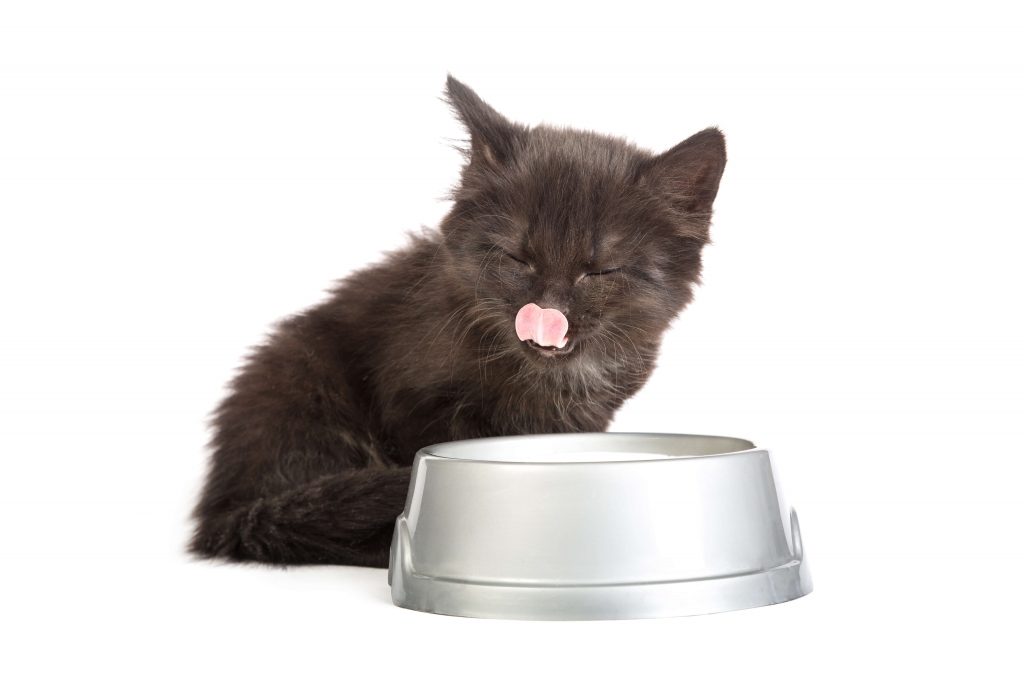
Cats can be in pain after the operation. However, it’s not always easy to tell if a cat is suffering. After neutering, your cat will stay in the practice or veterinary clinic to wake up and be observed. He will be kept warm and given pain-relieving medication. At home, you should make sure that your cat has a warm, well-padded place to rest near the floor. Make sure that he has short, flat paths and that water and a litter tray are close by.
Wound care
The vet will explain how to treat the wound before you go home with your cat. Make sure your cat does not keep licking the wound or trying to nibble on the stitches. If she won’t stop, she will need to wear a special collar, ruff or bodysuit.
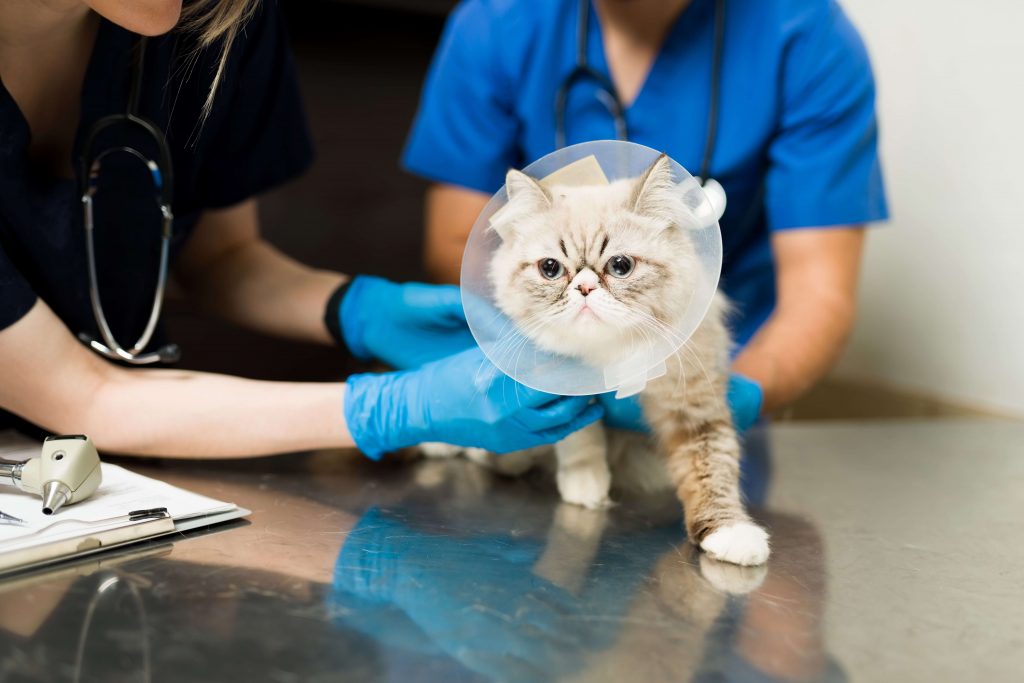
If a thread that dissolves by itself was used to stitch the wound in your princess, you do not have to go back to get the stitches removed. If not, it will be done after ten to fourteen days. This is not necessary with male cats since the small incision is not sutured.
Should I leave my cat alone after neutering?
Because of the anaesthetic, your cat will still feel a bit queasy a few hours after the neutering. Some cats feel nauseous and have to throw up. You should not leave your cat unsupervised at this time! Don’t leave her alone now. Stay close and take care of her. Make sure she feels well taken care of. You don’t have to pet her around the clock, but you should check on her regularly and make sure she is doing well.
When can a cat go out again after neutering?
It may be difficult but as long as the anaesthetic is still having an effect – i.e. for about a day – you should not let your cat outside! Not even with a collar or ruff, as the cat can easily injure itself outside. It’s best to wait until the wound has healed properly before letting your cat out. Then the wound cannot burst open or become infected due to dirt or germs. Discuss this with your vet. S/he can assess the healing process and advise you when the time is right.
How should I feed my cat after neutering?
Directly after neutering, you should only offer your cat some food in the evening. In general, you should adjust your cat’s diet before neutering. It’s best to give your cat enough time to adjust. Use a progressive approach when changing to a calorie-reduced food. Mix the new food with the previous food in increasingly quantities to wean your cat off its usual food.
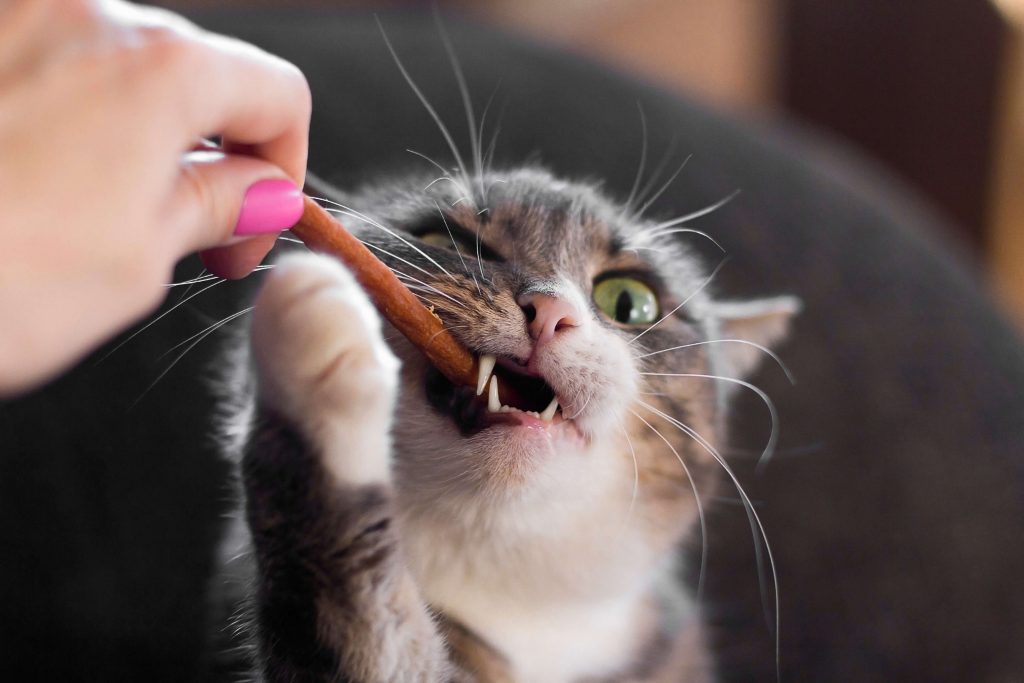
Behavioural changes in cats after neutering
Does a cat’s behaviour change after neutering? Does her whole demeanour alter and how she communicates with you or other cats? Cats react very differently and over time to the hormonal change. Some female cats don’t notice it at all and behave in the same way as before the operation. Male cats are generally not so dominant and the marking stops. However, it does take time until hormone levels decline – it will not be apparent immediately after neutering. This can take a few weeks.
Is a cat is more affectionate after neutering?
If you have always wanted an affectionate cat, you can rejoice! Irritable grumps may not turn into cuddly bears, but a cat that previously went its own way but paid attention to you when you gave it food, will probably become more affectionate, gentler and cuddlier after neutering. Some cats even become your shadow – wherever you are, they want to be!
Is a cat unclean after neutering?
When a cat is “unclean”, we understand this to mean that it wets places with urine. However, our furry friends put down “urine marks” to communicate. For other cats, this is like reading a kitty newspaper. Ah ha – this one passed by: it’s his territory. Or like love notes: she wants a tryst! After neutering, the sex drive is diminished by the reduction of hormones and usually stops after a while. If your cat still marks, she or he has other reasons. You should get to the bottom of this.
Is a cat is calmer after neutering?
If cats are neutered long after sexual maturity – i.e. they have been adults for some time – they may become somewhat calmer after neutering. However, this does not apply to all cats! The mating season is a stressful, exciting time for unneutered cats. When neutered, life is more relaxed, but not boring! Hunting and playing instincts usually remain as strong as ever! So there will still be action in the cat’s home! The only thing lacking is the excitement at mating time.

Is a cat more aggressive after neutering?
Have you ever had an operation? Then you know how it feels! Afterwards, you have to deal with the aftermath: discomfort, pain or nausea. Your whole body is weakened and feels miserable. You prefer to retreat to a quiet place, lick your wounds – so to speak – and don’t want to be disturbed. Your cat feels the same! So give her time to recover. Keep her away from other cats, other animals and people in the house. Otherwise, she may react more aggressively than usual. Once the wound has healed, this behaviour usually goes away!
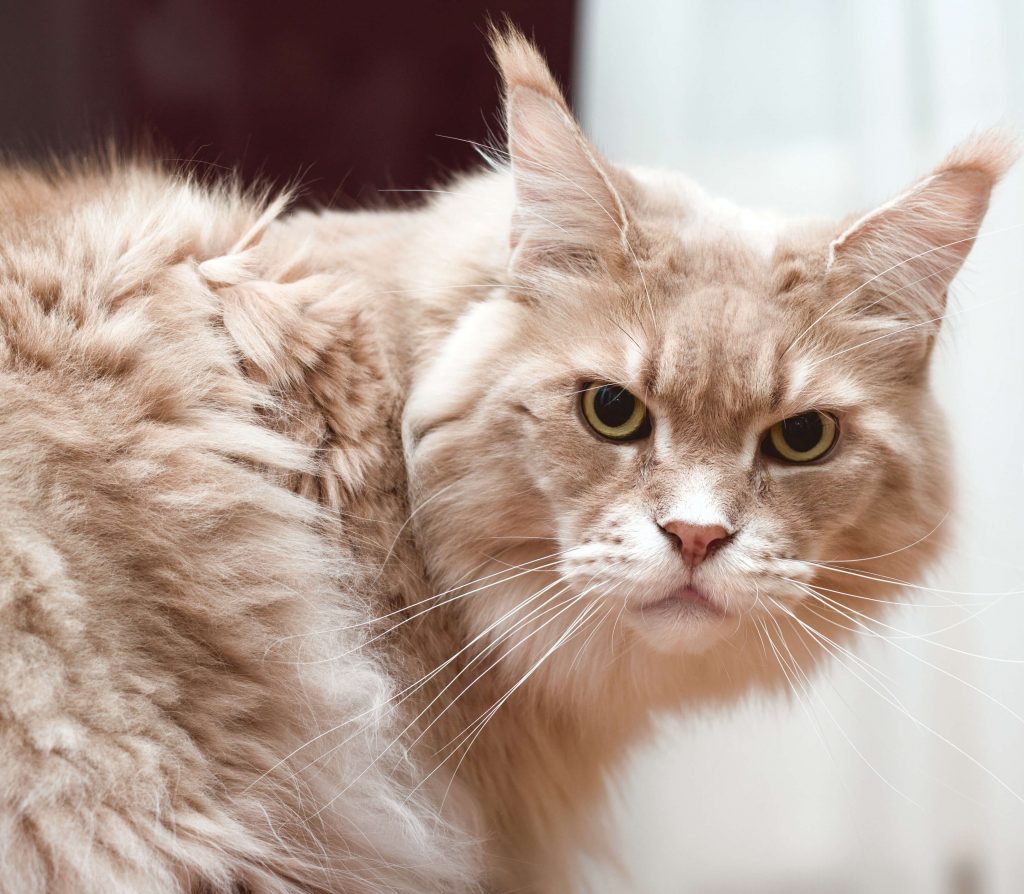
Can a cat still be in heat after neutering?
It is rare, but possible. Sometimes cats come into heat despite neutering. If the ovaries are not completely removed, a cat can come into heat again after neutering. She will then show the same behaviour as before – she may even be ready to mate! But even with Ovarian Remnant Syndrome (ORS), which means there is still some ovarian tissue left in the cat’s body, she cannot get pregnant again! If a follow-up examination shows that residual tissue remains, it can be removed in a second operation.



